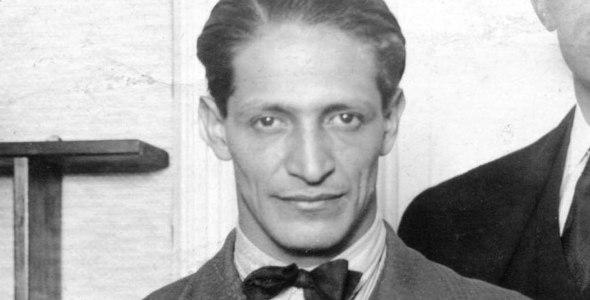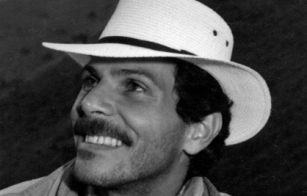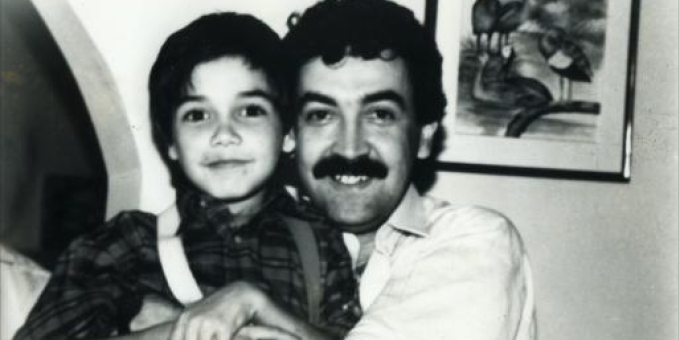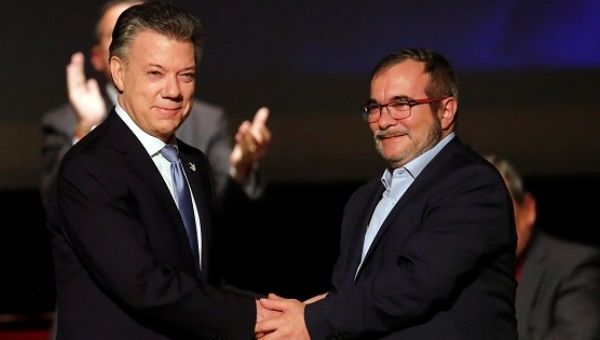Latin America
Related: About this forumColombia's former FARC rebel chief 'Timochenko' to run for president
For most Colombians, former rebel chief Rodrigo Londoño – better known by his wartime alias “Timochenko” – is more commonly associated with kidnappings and bomb attacks than voter polling and stumping on the campaign trail.
So an announcement that the leader of the demobilised Revolutionary Armed Forces of Colombia, Farc, plans to run for president in next year’s elections, has prompted widespread outrage in the Andean nation.
His first test will be convincing a suspicious electorate that he has left his violent past behind. Within minutes of the announcement, “Timochenko” was trending on Colombian Twitter – with most users expressing anger.
“Each vote that Timochenko receives is an insult to the victims,” one user tweeted.
But Londoño’s move into politics forms a crucial part of a peace deal sealed last November, ending 52 years of war that left 220,000 dead and more than seven million displaced.
At: https://www.theguardian.com/world/2017/nov/01/colombias-former-farc-rebel-chief-timochenko-to-run-for-president
Bullets to ballots: Colombian President Juan Manuel Santos and former FARC leader Rodrigo Londoño.
COLGATE4
(14,732 posts)Judi Lynn
(160,542 posts)NOVEMBER 01, 2017 4:53 PM
BOGOTA, COLOMBIA
Colombia's demobilized guerilla movement nominated Rodrigo Londono on Wednesday to run for president in the South American nation's election next year, keeping the former top commander at the helm of the rebels' nascent political party.
Londono, better known by his alias Timochenko, became the leader of the now-disbanded Revolutionary Armed Forces of Colombia in 2011 and has been a key figure in the peace process to end Latin America's longest-running conflict.
. . .
"The common people and those who dream of a new country will have their representation," said Ivan Marquez, a former rebel leader who served as chief negotiator during talks with the government.
. . .
Polls within Colombia indicate the FARC remains deeply unpopular, though one recent Gallup survey said the ex-combatants have a higher approval rating than the nation's traditional political parties. Recent corruption scandals and division over the peace process have tarnished many Colombians' opinion of their nation's political leaders. Still, Londono and the other former rebels vying for political office are certain to face an uphill battle.
More:
http://www.kansascity.com/news/nation-world/article182067181.html
Judi Lynn
(160,542 posts)Colombia's historic peace plan has a bloody legacy to overcome
Christopher Woody
Sep. 25, 2016, 6:14 PM
. . .
In 1984, Colombia reached a deal with FARC rebels that allowed the group and other leftist rebels to reenter Colombia's legitimate political sphere. The Patriotic Union (UP), a political party, emerged from this agreement, forming in November 1985.
The UP performed well in Colombia's 1986 elections, but the backlash — a violent campaign to eliminate the newly formed leftist party and its sympathizers — soon started.
In 1987, the UP's leader and presidential candidate from the previous year, Jaime Pardo, was gunned down by a 14-year-old with ties to a Medellin cartel member.
Between 1986 and 1990, some 4,000 to 6,000 members of the UP were slain. In the party's first four years of existence, a member or supporter was killed once every 39 hours.
Ahead of the 1990 presidential election, 70% of the center-left candidates were assassinated, including UP candidate Bernardo Jaramillo, according to Greg Grandin, a historian and professor at New York University.
"I believe, and I say it with all sincerity and at times coldly, that I know they are going to assassinate me," Jaramillo said before he was killed.
The effort to extinguish the UP was carried out by a brutal chimera of state security forces, armed right-wing groups, and drug traffickers — most prominently members of Pablo Escobar's Medellin cartel.
More:
http://www.businessinsider.com/colombia-peace-deal-history-of-violence-against-rebels-and-leftists-2016-9
Mr. Londoño, your life will not have been in vain. In the end, the good people of this world will WIN against the hate merchants and power mad monsters.
Judi Lynn
(160,542 posts)who dared to run for public office since this evil murder in 1948:
Jorge Eliecer Gaitan
Jun 17, 2014 posted by Larisa Sioneriu
Known as one of the most charismatic political leaders in Colombia’s history, Jorge Eliecer Gaitan is regarded as one of the country’s defining historical figures, shaping the nation’s course and its socio-political stage through the last half of the 20th century.
In his political career, Gaitan served as the Minister of Education, Labor Minister, mayor of Bogota, became the leader of the powerful Liberal Party and vied for Colombia’s presidency. His assassination in 1948 was considered the starting spark of “La Violencia”, the violence, which claimed the lives of some 300,000 Colombians.
With his own particular brand of populist activism, Gaitan advocated for the awakening of Colombia and the inclusion of minorities in socio-political life and fought against the oligarchy that had ruled the country since 1848.
Using his persuasive and pedagogical skills to manifest his then revolutionary ideology, Gaitan managed to mobilise the country through social movements like never before, his death being the climax of a historical turning point. The aftermaths of Gaitan’s death still reverberates in Colombia today.
Early Life
Jorge Eliecer Gaitan Alaya was born in 1903 in Bogota to a modest lower middle class family. The financial situation of his family impeded Gaitan from attending formal education before the age of 11.
However, his interest for education got him as far as becoming a lawyer and holding a doctorate in jurisprudence from the Royal University of Rome, Italy.
~snip~
Gaitan’s popularity escalated considerably when he became involved in the United Fruit Company scandal, also known as the banana massacre. In 1928, Colombian workers for the American company declared a strike demanding basic labor rights in the town of Cienaga near the northern city of Santa Marta. The month-long strike were violently suppressed by government forces, resulting in the death of an unconfirmed number of workers, thought to be anywhere between 47 and 2,000.
More:
http://colombiareports.co/jorge-eliece-gaitan/

Jorge Eliecer Gaitan
~ ~ ~

Luis Carlos Galán
Luis Carlos Galán Sarmiento (29 September 1943 – 18 August 1989) was a Colombian liberal politician and journalist who ran for the Presidency of Colombia on two occasions, the first time for the political movement New Liberalism that he founded in 1979. The movement was an offspring of the mainstream Colombian Liberal Party, and with mediation of former Liberal president Julio Cesar Turbay Ayala, Galan returned to the Liberal party in 1989 and sought the nomination for the 1990 presidential election.
Galán declared himself an enemy of the drug cartels and the influence of the mafia in Colombian politics, in this case the main drug cartel being the Medellin Cartel led by Pablo Escobar and who unsuccessfully tried to become a member of the New Liberalism Movement in his bid to become a member of the Colombian House of Representatives. Galán denounced Pablo Escobar in a public rally, and supported the extradition treaty with the U.S, contrary to the wishes of the Colombian cartels that feared extradition to the U.S. After receiving several death threats, on August 18, 1989, Galán was shot to death by hitmen hired by the drug cartels during a campaign rally in the town of Soacha, Cundinamarca. At the time, Galan was comfortably leading the polls with 60 per cent favourable ratings for the forthcoming 1990 presidential election. The investigation into his assassination remains unsolved.
. . .
Assassination[edit]
According to accounts the first assassination threats were calls made to Galán's home telephone number after the Liberal Party convention to nominate an official candidate. Flyers were left in the mailbox threatening to kill or kidnap his children. An attempt to kill Galán with an RPG was thwarted while visiting Medellín on 4 August 1989. The assassination attempt was prevented by men working for Waldemar Franklin Quintero, the commander of the Colombian National Police in Antioquia. Accompanying Quintero and Galán was the mayor of Medellín, Pedro Pablo Paláez; both Paláez and Quintero would be killed within a few weeks of the assassination attempt. After these assassinations, Galán and his family restricted their travels, especially at night.[8]
Later on, Galán's staff received information from the Colombian intelligence services advising him of the presence in Bogotá of a group of hitmen with the intention to kill him. His staff advised him not to travel to the town of Soacha and that the trip to Valledupar was more suitable since he was also scheduled to attend a football match in nearby Barranquilla for a 1990 FIFA World Cup qualification match in which the Colombian team was going to play. At the last moment, Galán changed his mind and ordered his staff to prepare to go to Soacha.[8] Galán was killed as he walked onto the stage to give a speech in front of 10,000 people in Soacha. At least ten others were wounded in the gunfire.[9]
The Colombian drug cartels were worried about the possible approval in congress of an extradition treaty with the United States, and political enemies feared Galán's increasing power would isolate many of them from the voters. According to John Jairo Velásquez a.k.a. "Popeye" and Luis Carlos Aguilar a.k.a. "El Mugre", former hitmen of Pablo Escobar, the assassination was planned in a farm by Escobar, Gonzalo Rodríguez a.k.a. "El Mexicano", Liberal political leader Alberto Santofimio and others. Velásquez affirmed that Santofimio had certain influence over Escobar's decision making, and he had heard Santofimio say "kill him Pablo, kill him!".[10] Santofimio told Escobar that if Galan became President, he would extradite Escobar to the United States. Other potential perpetrators were mentioned by a demobilized member of the AUC paramilitary group, "Ernesto Baez", who testified that the murder of Galán was organized by the Colombian mafia with the participation of corrupt members of the military and the DAS.[11]
https://en.wikipedia.org/wiki/Luis_Carlos_Gal%C3%A1n
. . .


Carlos Pizarro Leongomez
Carlos Pizarro Leongómez (6 June 1951 – 26 April 1990) was the fourth commander of the Colombian guerrilla group 19th of April Movement (Movimiento 19 de Abril) (M-19). Pizarro later ran for president of Colombia after the demobilization of M-19 that transformed the group into the political party, M-19 Democratic Alliance (Alianza Democrática M-19) (AD/M-19). Pizarro was assassinated on 26 April 1990.[1
. . .
AD/M-19 formation and death[edit]
Main article: 19th of April Movement
After 19 years in operation the group, commanded by Pizarro, began negotiating with the Colombian government, in April 1989, for demobilization conditional on certain grounds.[5] The primary request of the group was a full pardon for all prior activities as well as the right to form a political party. M-19 in return agreed to turn over all weapons and not to return to violent activities, the demobilization date was set for mid December 1989.[6] The accord was signed in the town of Santo Domingo by Jaime Pardo Rueda, adviser to the president, Raul Orejuela Bueno, Minister of Interior and Pizarro, Commander of M-19.[1][7][8]
Following the signing of the accord, M-19 announced Pizarro would officially run as the group's presidential nominee in the 1990 elections. He was assassinated shortly thereafter in a plane on April 26, 1990 by a young paramilitary thug named Gerardo Gutierrez Uribe aka "Jerry". During the 1990 presidential campaign, three candidates were assassinated: Luis Carlos Galán, the leading Liberal candidate, Bernardo Jaramillo Ossa for the political party Unión Patriótica (UP), and Pizarro.[9][10] Following the assassination, Antonio Navarro Wolff accepted the nomination of AD/M-19.[11] Wolff would later finish third in the race, with 12.7% of vote, losing out to César Gaviria who later appointed him the position of health minister.[12]
Chief Prosecutor Alfonso Gomez would later charge Carlos Castaño, former leader of the United Self-Defense Forces of Colombia (Spanish: Autodefensas Unidas de Colombia) (AUC), for the deaths of Jaramillo Ossa and Pizarro on May 24, 1999.[13][14]
https://en.wikipedia.org/wiki/Carlos_Pizarro_Leong%C3%B3mez
. . .


Bernardo Jaramillo Ossa
Bernardo Jaramillo Ossa (born in September 2, 1956 in Manizales, Caldas, died in Bogotá, Cundinamarca on March 22, 1990) was a Colombian politician and member of the Colombian Communist Party. Jaramillo started working primarily in the Urabá Antioquia region until 1987 when he assumed the presidency of the Patriotic Union Party (UP) after the assassination of Jaime Pardo.
.
Murder[edit]
Jaramillo had been very vocal in denouncing the systematic assassination of members of UP, attributing them to the rise of right-wing paramilitary forces in allegiance with drug trafficking cartels, and approved and even supported by the military and other political forces.[1] He specifically blamed president Barco of ignoring the evidence of the collaboration between drug cartels and Colombia's military to create and fund the paramilitary forces responsible for the assassinations. Two days before his assassination, Carlos Lemos, who was the Minister of Government at the time, dismissed Jaramillo's accusations and in turn suggested that UP was the political branch of FARC. Jaramillo responded by saying that such accusation was both unfair and baseless, and that it meant essentially a death sentence for him and UP members, which proved true just two days later.
Jaramillo was murdered while campaigning in Bogotá on March 22, 1990.[2][3] He was in Bogotá's Puente Aéreo terminal of El Dorado airport with his wife Mariela Barragan and several bodyguards provided to him by DAS. Despite having received death threats, he refused to wear a protective vest. Once he was in the terminal, he was waiting for his flight to Santa Marta, where he would go on vacation after the exhausting presidential campaign.[4] A young paramilitary hitman, named Andrés Arturo Gutiérrez Maya, waited for him while he and his wife were in front of a pharmacy, then pulled out a Mini Ingram 380 machine gun and fired on the candidate.
[5][6] A guard pushed the wife away to prevent her being shot as well, while other bodyguards chased after the murderer, whom they shot and captured. Jaramillo fell wounded in the arms of his wife and uttered three sentences: "Mi amor, no siento las piernas. Estos hijueputas me dieron, me voy a morir. Abrazame y protegeme. [My love, I don't feel my legs. These motherfuckers got me, I am going to die. Hug me and protect me.]"[6] He was put in a car by his wife and few other bodyguards, where he lost consciousness, and then taken to the hospital of the National Police. He died before he could be put in the surgery room, after a delay in the elevator at the clinic.
After his assassination other members in or related to his party were also killed.
https://en.wikipedia.org/wiki/Bernardo_Jaramillo_Ossa
